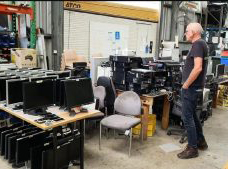By Judith Kerr, Quest Newspapers | April 8, 2020
A TEAM of volunteer computer boffins is working around the clock over the next two weeks to build computers so the poorest students in the southeast will be able to log on to lessons on day one of Term 2.
Social enterprise company Substation 33, which strips down dead computers and uses the parts to build new ones, has been given the challenge to provide repurposed “coronavirus computers”.
The team’s efforts are being spurred by enterprising principals from some of the largest schools in the southeast who are working over the school holidays to ensure online classes proceed without a hitch in Term 2, which starts on April 20.
Harry Green, 15, of Jimboomba was one of the lucky recipients of a refurbished computer, which will help him complete his year 10 studies online.
Substation 33 founder Tony Sharp said the team was setting up second-hand PCs with easy-to-follow instructions so students like Harry or their parents could install them at home.
“Nobody knows what is going to happen in two weeks, but there is a good chance that most of the students will be learning from home on a computer,” Mr Sharp said.
“But we know that there are lots of kids in the southeast and Logan who don’t have access to a laptop or a PC.
“People who are with Optus who don’t use all their mobile data every month, can donate data back and Optus will make it available to their charity partners to be used by young students in need,” he said.
The cost of a refurbished substation 33 personal computer is $100 which includes a dongle to enable wi-fi access.
The dongle allows families to use their home internet plans or mobile phone “hotspotting” to get online access.
Beenleigh State High School principal Matt O’Hanlon said about 30 per cent of students at his school of 1300 did not have personal computers and were “making do” with hard copies of lessons.
He said the school had about 350 computers out on loan over the holidays but more were needed.
“We are ready to do online lessons in Term 2 but there are still some students who don’t have computers which we are hoping to rectify,” he said.
“The other issue is many of the public places where kids go to download lessons using the free wi-fi are now closed – such as the fast food chains and restaurants.
“But staff have done everything possible before school closed to make sure that poorer kids without computers are not disadvantaged.”
Mr O’Hanlon said staff were working on plans to ensure the school’s 30-plus year 12 ATAR students would not have to repeat.
He said those doing traineeships were already using modules that would not have to change if classes were conducted online.
Public schools including Marsden State High, which has 2850 students, will tap into the state government’s secure online learning platform in Term 2.
Executive Principal Andrew Peach said the government online system was secure.
“Our staff worked exceptionally well as a team over the last week of the term to ensure learning resources were available online and in booklet format for the families without internet access,” he said.
“The structure of the timetable at Marsden will remain the same even in an online environment and staff will be there to support students in their normal scheduled class times. “We have a large number of classes already accessing online elements of their learning, so for them it will be an easy transition.
“Everyone is in the same situation, and no one will be left behind. The year 12 students are already being supported by the Queensland Curriculum and Assessment Authority, with a reduction in assessment items.”
Loganlea State High principal Brenton Fairleigh said his school was also on track for Term 2 with students in years 10 to 12 borrowing laptops from the school at no charge and those in years 7 to 9 were able to borrow IPADs at no charge.
He said teachers had produced online learning platforms for every class and had printed work posted home to students who do not have internet access.
Windaroo State High School principal Tracey Hopper said students collected STEM kits so they could work on projects at home.
The kits included keyboards, mouse, display, and electronic equipment such as raspberry pi, which students could use to work on their coding.
Private schools were also prepared for the first day back at school.
The prestigious John Paul College at Daisy Hill and Canterbury College at Waterford had already started using video, online forums, shared learning platforms and live chat groups.
John Paul College Principal Karen Spiller said a trial run of the online learning programs was held during the last week of school.
She said the feedback from students, parents and teachers was that real-time interaction was of high value.
Mrs Spiller said children of working parents would still attend campus classes but all would be following the online programs.
“Our programs have also extended beyond the classroom to our co-curricular programs including music, choir, dance, cheer and sports,” she said.
“Our performing arts lessons have also moved online, with individual and group lessons, conducted using Microsoft Teams.
“Next term, our Sports and Activities Teams will launch fitness videos and resources aimed at keeping students fit while they are unable to participate in sports.”
Year 5 student at the college Taylor said he liked the new programs.
“It’s not all on the laptop as our teacher sets tasks off-screen and we aren’t just having contact with our laptop all the time,” he said.
“We start the day by taking the roll by doing a poli survey and saying ‘Good Morning’ to our teacher.
“We check our individual OneNote pages so we can see if our teacher has left us any advice.
“We then do a video chat from 9am to 2pm daily. We have lots to do during our breaks and downtime as well.”
■ Parents whose child needs a computer to continue their schooling at home, should call Substation33 on 3826 1533 to get orders or email us at [email protected]


